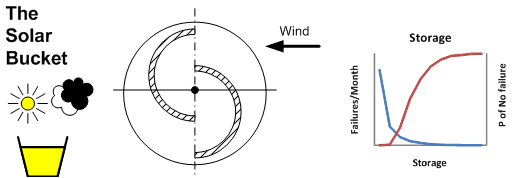This week my son came up with the observation that the world's biggest hotel company does not own any hotels and a company has launched a peer-to-peer delivery service. In both cases, the common element is the software that links the service provided with the consumer. The government also announced that it was withdrawing subsidies for new onshore wind farms. Do these events have anything in common; probably not, but there maybe an idea which is worth exploring.
Subsidies is often difficult to discuss. The concept is that a government provides an incentive to for someone to do something useful which would otherwise be uneconomic and recovers the cost from the tax payer or the consumer. The downside of subsidies that they can become subject to the doctrine of unforeseen consequences which are painful to rectify. An example is agricultural subsidies, after the second world war European governments wanted to stimulate food production and a system of subsidies evolved and people got fed but a few decades later, the system is producing "butter mountains" and "wine lakes" as supply and demand become unbalanced. This leads to policy reform and farmers have to diversity and buildings that once sheltered cows become holiday homes for economists. Maybe, a better designed policy could have given agriculture a smoother path. We all eat, so why can farming be unprofitable.
Supporting sustainable energy is a good thing, part of the support is intended to increase the proportion of energy which is produced from sustainable resources, however, in the author's opinion, the object should be to lower total emissions. To lower emissions you need a policy which encourages energy management and storage. Wind energy comes in pulses a few days apart, these pulses are stronger in winter when the sun does not shine brightly and it does not shine at all at night. My perception is that investment in sustainable sources is driven by the system of FITs and strike prices and that investments in sustainable generating capacity do not displace fossil/nuclear sources. Incorporating a few kwh of storage into a household's energy economy could become a game changer. Ignoring seasonal variations, the peak energy demand in most homes is morning and evening, in the morning people are showering and breakfasting and in the evening they are cooking and staring at screens, the peak of solar energy generation is at solar noon. At present, most of this imbalance is mopped up by gas fired turbines. The availability of solar power during the day allows them to be throttled back and powered up when the lights go on in the evening. Maybe with a few kwh of storage per household, you can retire some existing fossil/nuclear capacity by storing wind and solar generated electricity when it is available. I have not studied this in detail, but I think that it is only Germany which has some support for storage. The shadow of subsidy cuts raises the fear of job losses in established industries which are painful, could a better policy created a more balanced industry.
Assumptions are always dangerous, but I need to make at least two. My perception is that people fear rising bills and don't care too much where their energy comes from if their lifestyle remains unchanged. Without being obsessive and using LED lights we have trimmed our electricity consumption by about 25%. I am intrigued by the internet-of-things, I may be weird, but I am prepared to share the management of my fridge if I get to share the savings. Add some storage and there are some interesting ideas to explore.
Roof-top PV is well established and there are a couple of reasonably sized wind turbines withing cycling distance of where I live. One of these is owned by an opera house, this is not an obvious form of diversification but their land includes an ideal bit of Downland ridge. Consumers and producers are linked by the grid creating at least a theoretical basis for peer-to-peer energy. For the concept to work there has to be some economic realism, the price offered by the consumer has to make sense to the producer. Ideally, green energy would have a premium which would offset subsidies.
Despite having spent much of my life writing software, I'm ashamed to say the my mobile phone skills are poor compared with those of my children. They run whole chunks of their lives with their phones, objects for which there is only a transient need for are traded on eBay, cheap fares are found on off-peak trains and friendships are maintained across continents. At present energy is not an obvious addition to this array, but................
Sunday, 21 June 2015
Subscribe to:
Post Comments (Atom)



No comments:
Post a Comment